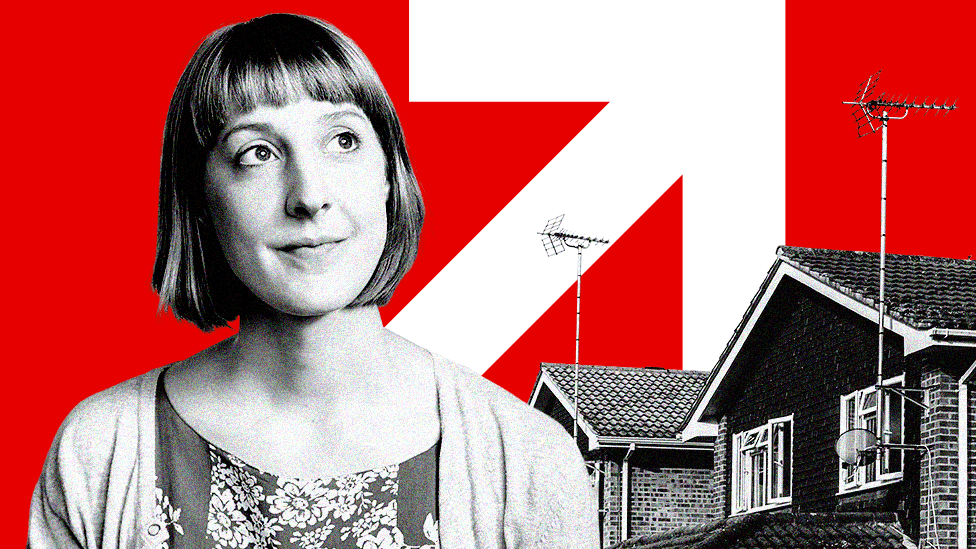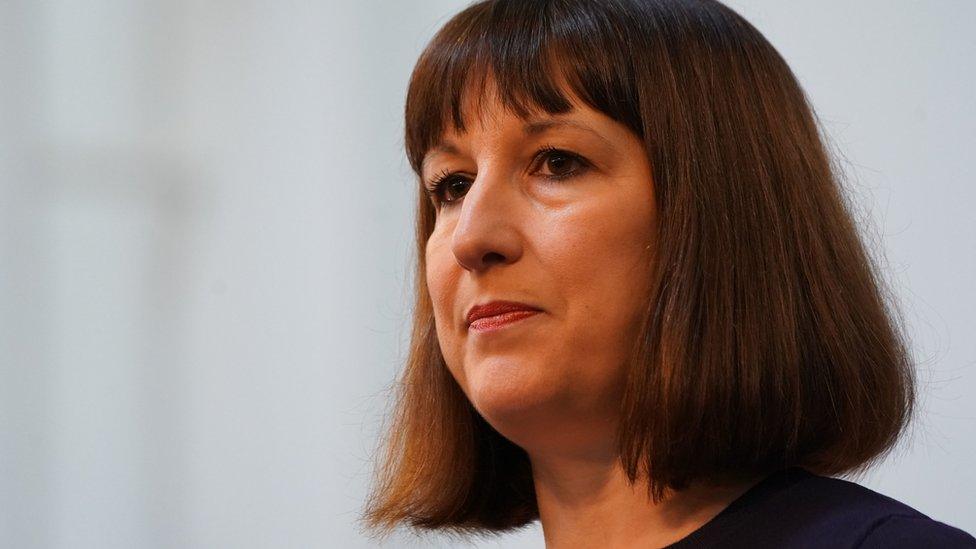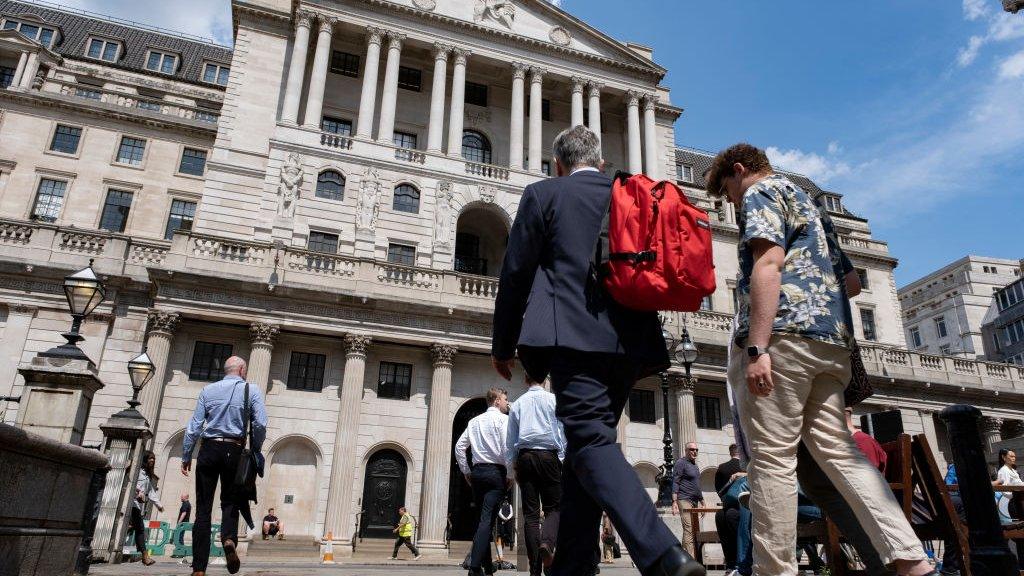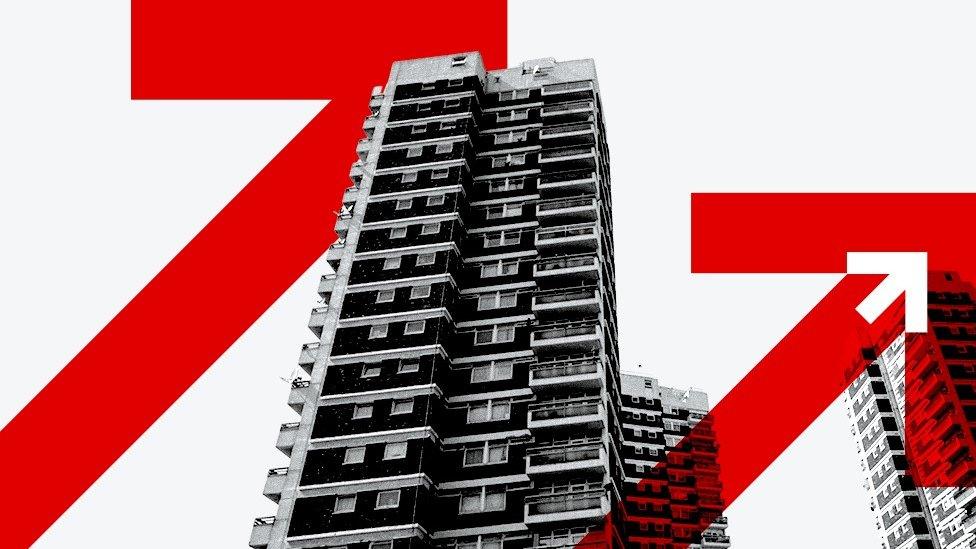Mortgages: Banks promise more protection as mortgage rates soar
- Published
- comments

Banks and building societies will offer more flexibility to struggling mortgage-holders as rates soar.
The move comes after bank bosses met the chancellor, Jeremy Hunt, in Downing Street on Friday.
Borrowers will be able to make a temporary change to their mortgage terms, then will be able to return to their original deal within six months.
This would allow some to have lower repayments for a short time, by just paying the interest on the home loan.
Mr Hunt said the six-month flexibility on switching terms would not affect credit scores as it may have done previously.
However, it will still be the case that missing payments or taking a total break on payments, known as a mortgage holiday, will still harm someone's ability to borrow in the future.
Lenders also agreed to a 12-month delay before taking repossession proceedings against borrowers unable, or unwilling, to pay over the long term.
Bank chief executives described it as a "productive" meeting as they left Downing Street.
Earlier this week, the Labour Party issued a five point plan which it said would ease what it called "the Tory mortgage penalty" and help limit repossessions.
Shadow chancellor Rachel Reeves called the chancellor's latest statement "a weak response".
"Questions remain on how voluntary these measures are," she said. "The government must offer clarity and confidence to homeowners by putting in place requirements now to reassure households."
The meeting between lenders and Mr Hunt comes after Thursday's shock decision by the Bank of England to raise interest rates to 5%, up from 4.5%, as it tries to tackle inflation.
Millions of UK households will see their budgets squeezed as a result.
The post-meeting announcement was never going to lead to direct government intervention to help those who are struggling, but it will kick-start a campaign to make them aware of their options.
The idea is it encourages people to talk to their lender if they are in trouble, without feeling there are financial barriers in place to do so.
Mr Hunt said: "These measures should offer comfort to those who are anxious about high interest rates and support for those who do get into difficulty."
If you can't see the calculator, click here.
After Thursday's rate rise, some, including the National Residential Landlords Association (NRLA), called for government action, such as the reintroduction of mortgage interest relief and the unfreezing of .
The NRLA warned that interest rates of 5% could force landlords to sell 735,000 rental properties which it said would "exacerbate the ongoing supply and demand crisis across the private rented sector".
But Mr Hunt and Prime Minister Rishi Sunak have dismissed suggestions that the government should step in, arguing providing support for borrowers could undermine the Bank of England's battle against inflation. Figures released on Wednesday showed remained stuck at 8.7% in May.
After the interest rate rise was announced, Mr Sunak said the government would remain "steadfast and stick to its plan" to bring down inflation.
The interest rate rises are partly aimed at dampening spending in the economy, by reducing people's disposable income. So analysts have pointed out that providing general support for mortgage-holders would work counter to the Bank of England's policy.
Bank of England governor Andrew Bailey admitted on Thursday that the 13th consecutive rise in rates since December 2021 would cause "difficulty and pain" for many. Those with loans would be "understandably worried" he said.
Mortgage rates have been rising for months. An average two-year fixed rate mortgage is currently at 6.19%, while the five-year rate is 5.82%, according to financial data firm Moneyfacts. In June last year those rates were closer to 3%.
Rising interest rates can also reduce spending in the economy by boosting the incentive to save money.
The BBC understands some savings rates have already been put up following Thursday's rate rise. But in recent weeks, MPs have criticised banks for failing to pass rate rises on in full to savers with easy-access accounts.
Harriet Baldwin, chair of the Treasury Committee, told the Today programme that High Street banks had been "incredibly slow" in passing on rate rises.
She said that banks had "taken it for granted that we've got used to not earning anything on savings", adding that savers were "basically being taken advantage of at the moment".

What do I do if I can't afford to pay my debts?
It is important that you do talk about financial difficulties before finding yourself in a spiral of debt. The earlier, the better.
If you think you cannot pay your debts or are finding dealing with them overwhelming, seek support straight away. You are not alone and there is help available.
A trained debt adviser can talk you through the options available.


How will the latest interest rate rise affect you? You can share your experiences by emailing haveyoursay@bbc.co.uk, external.
Please include a contact number if you are willing to speak to a BBC journalist. You can also get in touch in the following ways:
WhatsApp: +44 7756 165803
Tweet: @BBC_HaveYourSay, external
Please read our terms & conditions and privacy policy
If you are reading this page and can't see the form you will need to visit the mobile version of the BBC website to submit your question or comment or you can email us at HaveYourSay@bbc.co.uk, external. Please include your name, age and location with any submission.

Sign up for our UK morning newsletter and get BBC News in your inbox.

Related topics
- Published8 January 2024

- Published22 June 2023

- Published22 June 2023

- Published23 June 2023

